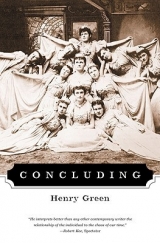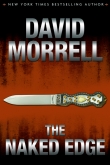
Текст книги "Concluding"
Автор книги: Henry Green
Жанр:
Современная проза
сообщить о нарушении
Текущая страница: 13 (всего у книги 14 страниц)
"In a minute," her lips shaped back across the shattering valse. He did not take this in, misunderstood it for impertinence.
But when, inevitably as tumbled water, the dance delivered them over, two leaves that touch beneath a weir, caught in the eddies, till they were by his side, she awoke Sebastian as she drew offfrom the young man's arms. He said, "Why hullo, sir?"
"We must go. We are not welcome," the grandfather told Liz.
"Hush, Gapa," she said. But he walked away, they followed, and a second time that group of children opened, reclosed behind the couple trailing after, having parted as another vast bloom might that, torn by a wind in summer, lies collectedly dying on crushed fallen leaves, to be divided by one and then two walkers, only for a strain of wind to reassemble it, to be rolled back complete on the path once more, at the whim of autumnal airs again.
The three left music.
"Hush," she at last repeated, when he could hear.
"There is no use. We are not wanted," Mr Rock announced, in a low voice.
"Why? What? I insist, has anything happened?"
"We need never have demeaned ourselves," he said.
"Oh do say," she wailed. "Was it dreadful? But Gapa, you're making me nervous."
"No. We have to get out, that is all," he explained. "D'you hear?" And came to a halt.
"Don't go now, sir," Sebastian cravenly protested.
They stood, a miserable trio in black cloth, in the dank dark; music at their heels.
"What?" Mr Rock demanded.
"I said why just yet?" Birt asked, pale and obstinate.
"I've seen enough," the old man proclaimed. "Miserable children that they are. Too much freedom here. Lack of control. All they have to do is chatter," he ended.
"Was it about your lectures, then?" she enquired.
"They're downright ill-natured," he replied, at a tangent. "And inclining towards a dangerous mentality in which I shall take no lot or part. I hope a man of my years would know better. Come out."
"But Gapa, don't you think, I mean mightn't it all look rather odd if we simply just walked off? Oughtn't we at least to say goodbye, you must agree?"
"Everything comes if one can bide one's time," Mr Rock said, to ignore her. He's certainly waited long enough, Sebastian considered.
"Whatever you say, of course," Elizabeth consented. "But we must at least offer thanks, surely? And I'm sure I don't know where Miss Edge's got to, do you Seb? I've a notion I haven't set eyes on her this last half hour, have you?"
"I don't like it, I don't like any of it. I'll shake the dust from my feet," the old man insisted. He was very upset.
"Yes, Gapa, but at the same time, after all, when we're merely uninvited, I mean you can't just come in and out as you please, can you? We should thank them. Don't you feel we'd better? Come on, of course you. . you know you do."
"Well then, where is Miss Edge?"
"Powdering her nose to pretend she's what she's not," Sebastian brought out in his parson's voice, to cheer them.
"Well, you can't chase after her in there, however you feel," Elizabeth protested, almost contemptuously, to the old man.
"Might I make a small suggestion?" Sebastian proposed, his own self again at last. "Could Liz and I finish this dance? We'd keep our eyes skinned for the guv'nor all the time."
The old man seemed visibly deflated, he thought. He wondered what had punctured him. No more than some second-hand foolery about Mary, he decided, satisfied Mr Rock was now in such a state of tired confusion that he would swallow, entire, any ancient guff the girls chose to hand out.
"They're fiends," Mr Rock protested all at once. "Fiends. Every single one."
"It's the girls are, Gapa. You listen to a woman," Elizabeth said of herself. "Miss Baker and Miss Edge aren't so bad." He glared. But he was not going to admit he agreed.
"So you won't come?" he challenged.
"Why, of course. Anything you want," she answered in a rude, spoilt voice. "But one must say thank you, surely?" she wheedled.
You know full well I'm afraid outside, alone in the dark, the old man accused Liz, in his heart. Her carelessness for his feelings made him tired and sick, twice over.
"Then I'll seek Miss Edge for myself," he replied, and stamped off towards the Sanctum. Sebastian made as if to follow.
But Elizabeth put a hand on the young man's arm.
"Let Gapa be," she said. "It's his pride. Don't I know, oh so well, so often. I can tell you what's happened. One of those horrid children, and they're out to simply ruin our lives, darling, yours and mine, has mentioned something about his lectures. But tonight I don't care, I'll just not allow anything to come between. Let's nip back for a minute. Oh, this heavenly tune. He'll cool off. He doesn't mean to go."
So they slipped back into the whirlpool to forget, to join in again. But she soon found she could not put Mr Rock out of mind, not yet, not all at once at all events.
Edge had retired for the treat of the day, a cigarette. Because one of these made her feel she had both feet up on mantelpiece, she usually kept herself to the one, night and day. It was delicious, so bad for her heart she even had the sensation she was drunk, and this evening, in the Sanctum, as a special, exceptional indulgence, she had started on another immediately the first was finished. And had no sooner done so before she heard leather shuffled outside. Upon which, while she could hardly get so far for that heavenly lassitude she inhaled, she went over to the door, pushed it wide, and came face to face with the sage.
Light was dark in the passage. He must have had difficulty to get along it to collect the rubber boots. And, as she swayed at his unexpected appearance, she found, without surprise, she now had nothing but pity for the old man.
She leant, a lightweight against a doorjamb, he brittle and heavy against the wall over on the side away from her.
"I'm off home," he announced abruptly, curious, for his part, to find he no longer seemed to hate the woman, all the go gone out of him.
"Why so soon, Mr Rock?" she asked, the butterfly gently fluttering in a vein at one of her temples, from the cigarette.
"Passed my bedtime," he lied.
"Won't you come in for a minute?" she invited, by the entrance to the Sanctum, then took another long draw at the weed to exquisitely drain more blood from her thin limbs. He made no move however.
"Can't help but worry about my cat," he replied, at random. "If I don't get her in she'll be out all night."
"Ah yes," she said, "the splendid creature."
"She comes over here such a deal," he added, rather petulant.
"So sweet," the Principal agreed, still with no trace of irony, speaking as though from another existence. Mr Rock was amazed. He had never known the woman so amenable. And then he himself could hear so well, away from the music.
"And has your granddaughter enjoyed it?" Edge enquired. Ah well, he thought, day is done, this is a truce.
"Liz? Of course she is older than the others."
"I saw her take the floor with Sebastian," the Principal said, in an approving voice.
"Those two are great friends," Mr Rock agreed, cautiously.
"I'd much like to have a little chat with you one day about that young man," Edge suggested, gentle, undangerously soft. The sage was not yet to be drawn, however.
"Yes?" he asked, to gain time.
With a languorous gesture, Edge took one more anaesthetising puff.
"I would really appreciate your advice on Sebastian," she said, in the laziest voice he had heard her use.
"You would?" he countered. He almost surrendered then.
"My dear sir," she murmured. "Need we be too formal the one night of our Founder's Day Ball? I don't really fancy so, do you?"
There was a pause. The old man struggled with a lump in his throat. Then he let go, gave way.
"She's all I have," he said, given over to self pity.
"She loves you," Miss Edge dispassionately stated.
Mr Rock swallowed twice.
"But I can't care for him, ma'am," he admitted, still as if in spite of himself.
"Nor me," the lady answered readily. They looked at each other with great understanding.
"I can't stomach parlour tricks," the old man elaborated, stronger.
"So curiously unwise," Edge agreed. "A word which is out of fashion nowadays," she added. "The girls don't seem to know the meaning, but there, I bless them," she ended.
"Liz has been ill…" Mr Rock began, mistaking the object, prepared to take offence at once.
"Why I declare, after all," she soothed him. "I spoke of the man, the tutor, the untutored tutor, please. I trust you would not think. ."
"My deafness," he explained, to cover the slip.
"D'you ever have treatment?"
"What's the good. I am too old."
"Never that, good heavens no," she countered, through a film of weakness.
"Well, there you are. I have to lump it," he said, and smiled.
"You of all men," she murmured.
"I've been most fortunate in my life," he admitted, weak as water yet again. All this sympathy was so unexpected.
"Look, come in, please. I can't tell what we are standing here for, could you?" she invited. "As a matter of fact, if you will keep our little secret, we've some sherry in the cupboard, Hermione and I."
He suddenly wondered if she could be drunk. He was not to connect the cigarette with her mood, because he had never previously seen the lady smoke. Yet it seemed he should be on guard. Nevertheless this was now a remarkable opportunity, he had to admit. He made up his mind.
"And I, for my part," he said, for better or worse weakly entering the Sanctum, "would appreciate if I could have two words with you? A domestic matter."
"My dear Mr Rock I make it my rule never to interfere." This was on the assumption that he could only be referring to Elizabeth.
"To do with your students, ma'am," he announced.
"Ah yes."
"They talk so."
"They do indeed," she languidly assented.
"There must be limits, after all," Mr Rock argued. She slumped quickly down, in an elegant attitude, to hold her cigarette like a wand.
"Where would you draw them?" she asked, at ease.
"Where would I draw the line?" he echoed, but without conviction. Then he pulled himself together. "Yet there must be human decency," he said in a firmer voice. "The give and take of a civilized community," he said. "Justice," he ended.
"Of course," she admitted. "Naturally, of course." This time with her first trace of malice which, however, was lost on him.
"Yes," he said, in a muddled way of the girls below. "I mean, they can go too far, can't they?" He was desperate.
"Yes?" she enquired.
There was a pause. Came again the lump in his throat. Once more he surrendered.
"I love her. She's all I have," he said. He could have sobbed.
Edge was so distant, so absent that she had forgotten Mary and Merode. What she could do, and did without the slightest sense of shock, was to ask herself if he had meant Moira all along.
"My dear," she murmured. "As time goes on one clings to what one has."
"She's all I have," he repeated, still about his granddaughter, secure in self pity.
"But is it wise, or fair, to foul the nest you have built?" she archly enquired.
"In what way?" he demanded, at a loss.
"Weren't you complaining of the child's behaviour?"
"Never," he protested, of his granddaughter.
She remembered she had not brought out the sherry, but let this go. She was too tired.
"Believe me, I think sometimes you are inclined to misjudge us, Mr Rock," she said. "We have eyes in our grey heads. And we prize your friendship for the child," she lied, a white lie.
"I don't follow," he said.
"Why, Moira of course," she patiently explained.
"We are at cross purposes, ma'am," he concluded with pride, suddenly and finally disgusted. Then he noticed that she had finished the cigarette. He offered another from his case, as a matter of course. She knew it to be madness, but how was she to refuse? So she lit up, as though this were the last action she would have strength for in life.
"We are just two old women trying our best, but we do have eyes in our heads," she repeated, obstinately gentle, unaware of the effect she had produced.
"Well, I don't think this Birt is up to any good here, either," the old man said, angry and tart. He had gone back to the doorway, so as to make good his escape, if need be, at a moment's notice.
"Where are you? I can't tell," she demanded.
And only an hour since, she would insist she had no trouble at all with her eyes, joyfully he reminded himself.
"Are you sure you feel all right?" he asked, after he had narrowly regarded her. He almost hoped she would fall sideways, flat on an ear.
"I'll let you into a little secret," she said. "It's these smokes. My one small indulgence. They make me rather giddy. But it's true I had a nasty turn this afternoon."
"How was that, ma'am?"
"Where on earth have you got to, man?"
"Here," he replied, and came forward a second time, betrayed by curiosity, only to sit, without thinking, in her own place, behind the great desk of office.
She did not notice.
There was a pause.
"You had a fainting spell?" he hazarded. He had long since learned all about it. He thought, perhaps she drinks all day.
"Oh, I've forgotten. Don't bother me," she said.
"Was it about this sorry disappearance, ma'am?" he persisted.
"Whose? Why, we've got to the bottom of Mary and Merode," she lied. "That did not take long. Absolutely nothing in their storm in a little teacup."
"Thank God," he said, anxious, of course, to learn about Mary.
"Why?" she dreamily wanted to know. "Can these children truly mean much to you?"
"Whatever occurs round this Great Place affects us all," he covered himself.
"Just one or two small points still to clear up," she emended, for, truth to say, she was superstitiously ashamed. "Believe me, Mr Rock, but now and again, at the end of a long day, I do get sick and tired of these girls. At their age they are terribly full of themselves, terribly."
Edge was being so revealing that Mr Rock once more decided he could not lose a minute of her present mood.
"Have you ever considered the fellow Adams?" he enquired.
"I had to see him this forenoon. Yes?"
"I thought he was hardly himself when we last met." Like someone else I could mention, he added under his breath.
"I couldn't get sense out of him at all. But I meet so many, so many," she said. "There was a Mrs Manley," she added.
"It seemed as though he had something on his mind."
"Yes?" she airily replied.
"A widower who lives alone in his cottage," Mr Rock suggested.
There was a pause.
"Why, so he does," she said. Mr Rock could see the gray light begin to dawn within the woman.
"It had just occurred to me, that's all," he said.
"And so he does," she repeated, but not with quite the conviction for which he listened in her voice.
A silence fell.
"Then tell me," she demanded, back to her more usual tones. "We do so value your counsel." And how often have you asked it, he commented to himself? "What would you propose?" she insinuated.
"I'm only an old fellow who's well passed his bedtime," Mr Rock countered. He had gone far enough. Yet he found that, if one tried, one could forgive this woman, and he wanted to bring the conversation back to himself.
"Oh, I'm tired too, deathly so," she idly agreed.
"I'm older than you. I'm older," he repeated.
She let this pass.
"I'm not much longer for this world," he said, on his dignity.
"Don't talk like that, Mr Rock, please. Tonight of all nights."
He sat, looking straight ahead.
"They will fiddle faddle so about themselves," Miss Edge went on, about the children. "It makes for such a deal of bother. I get no help from Baker, none at all," she ended.
He said no word.
"Strictly in confidence we are not certain of much about Mary yet," she went on, again in a most languid voice. "But we shall be tomorrow. I've had experience. Believe me. They will worry over trifles, but it all comes out in the wash, in the end."
He stayed silent. Contemplating his own death with disinterest, he did not catch what she said.
For her part, she felt so queer she hardly knew what she was doing, but found herself, somehow, committed to the following, as though on top of a hill in a dream on a bicycle with no brakes.
"Mr Rock," she began, then experienced a last titter, or wobble, before it was too late. She threw the cigarette away which had been burning her forefingers. She missed the fireplace. Falling on a State Kidderminster rug it began to glow, unnoticed. "Mr Rock," she said, a second time. For she knew now she could not go back. "You really should have someone to take good care of you. Marry again," she said.
At this she giggled, once. What a desperate expedient to gain possession of a cottage, she laughed to herself, almost completely out of control. She must be mad. But then, oh well, what harm was there? Things would all come out in the wash, be utterly forgotten come daylight.
"Why yes, yes," he said from the vast distance of his final, cold preoccupation, not having taken in the drift.
She dreamily excused herself to herself by thinking that, of course, he would not listen any more than he did now, which was not at all. This only proved, so she thought, that the kindest was to pack him off forthwith to an Academy of Science.
"I don't believe you bother with me," she rallied.
"How is that, then?" he asked, coming back to earth.
"I said, you must marry again." She spoke out with a slow simper which allowed of no misinterpretation. This, he at last saw, was an offer, and unconditional at that. He took it in his stride as entirely understandable; unthinkable of course, but not, in her pitiable circumstances, in the least surprising. He proudly ignored it.
At the same time he wished to let her down lightly, the safer course. He cast about him how to encompass this. And almost at once proceeded to discuss his health.
"I've been quite well the last few years. But there's none can dodge Father Time. Yet I sleep remarkably sound. I take care, naturally. Regular exercise every day, fetching Daisy's swill and so forth. No, it's just anno Domini."
She despised him for not, as she thought, having heard. Or had he? "What age are you really then?" she asked.
"Seventy-six next month."
"You don't look it," she lied. For she considered he looked more. Too old, too old, she admitted, in another part of her head. But now it was up to him, she knew.
"Not bad for an old fellow," he said, pleased. Oh, she must have lost her sanity just then, she thought, realising he did not intend to take her up. She would never, as long as she lived, ever indulge in so many cigarettes again. But was that, could it be, a smell of burning? And what had he meant, when all was said, discussing his health as he had?
"I keep a deal healthier, even, than she does," he remarked of Elizabeth.
"The child looks ever so much better," Edge agreed, dreamily, but with anguish. She still thought he referred to Moira. In a dazed state, she began to imagine larger and longer flames, as that smell came through.
"I am tired. I should go home," he said.
"In that case, goodnight," Edge answered from her deep chair, coldly, more of an enemy than ever. She had finally decided there would be nothing. "Look after yourself," she added with tired venom, while he dragged his body out of the Principal's rightful place, to take leave. She did not, of course, get to her feet when the old man came over. He, for his part, ignored the taste of burning. "Goodbye," she ended, gave him a slack hand. He turned his back to leave.
"Gracious," she remarked, as though to make conversation, having seen the cigarette at last. "Quite a blaze," she said, rose up in no haste, and stamped it well out.
Either he did not catch that, or could not be bothered, but he just stepped outside, closing the door behind him.
In the passage he gave one short, sharp laugh.
She heard.
Elizabeth, her thoughts on Sebastian, waited for Mr Rock outside the Principal's lavatory under a lighted bulb. She was watching a moth dab its own shadow up above. "It kisses," she said inside her.
When the grandfather came along, he remarked, "There you are, my child." Mr Rock's calling her his own as much as the old man allowed himself to show of how surprised and touched he felt that, after all, she should have spared time off to see him home. She gave no answer. She continued to watch the moth while he went past. She was concentrating on Sebastian.
Mr Rock bolted the door, sat on a seat, and laboriously took off those oldfashioned pumps. Then eased his toes. But when he got up to step into rubber boots, he trod right on the torch, which, so that he might not lose it, he had slipped down to a heel in one of the legs at the start of the evening. At once he remembered another time that same thing had occurred, when Julia was still alive and, for a further moment, was sorry for himself, heavy and bleak.
Then the old man sallied out, said "Come," and went to open the front door. It had two catches so that, for some minutes, he fumbled between his torch and door-handles. She did not lift a finger.
When, at last, the sage had it wide, the moon was so full and loud, that stored light he used fell altogether dimmed. What had been a round pat of yellow over brass knobs and keys became oval at his moonlit, shovel feet, but like cream on milk, a skim of one colour over something the same, and so faint he was able to switch the torch off at once. Indeed, he thought he could now see tolerably well, and was almost sorry he'd begged for her company. Not that he had, in actual words, ever asked her to come along, but at least he'd not, once again, denied what she knew perfectly, his age-long fear of the dark. Because, now they had left the house, his relief caused him to forget the pitch black between trees at night, which they were yet to meet in the ride leading to their cottage.
He even turned round to view the hated mansion which the moon, plumb on it, made so tremendous that he spoke out loud the name, "Petra."
Elizabeth followed in silence, struck into herself by the man she had left, deeply promising she would come straight back. She had no eyes for what was lavished from above, nor ears for what her grandfather expressed, astonished at the sight.
Lovesick, she walked as someone will who, in a dream, can find herself on frozen wastes where the frost is bright then black, but will still keep warm with the warmth of bed, although that imagined world outside stayed cold, dead cold.
Her grandfather, again in difficulty on account of the treacherous light, but glad of his escape, waded much as though the moon had flooded each Terrace six inches deep. For the spectacles he used seemed milk lensed goggles; while he cautiously lifted boots one after the other in an attempt to avoid cold lit veins of quartz in the flagstones underfoot because these appeared to him like sunlight that catches in sharp glass beneath an incoming tide, where the ocean foams ringing an Atlantic.
So much so, that when he came to the first flight of stone steps Mr Rock turned completely round and went down backwards.
Upon which a faint cry came from those beechwoods he had been facing. The great crescent of the moonlit house received and gathered the sound, sent this back in a girl's voice, only deeper. "Mar. . eee," the gabled front returned.
He was halted by it between two steps, "What was that?" he asked, peering over a shoulder at moondrenched trees, starched, motionless in the distance he had yet to traverse.
When his granddaughter did not deign to reply, Mr Rock assumed it must have been a noise in the head from his old heart, the sudden twang on a vein. He sighed. He began the climb once more, down his cliff face, grabbing at the balustrade each step he took.
Next he sneezed. Fumbled after a handkerchief. "Careful you don't take yourself a chill, dear," he called. But she ignored him. She warmed herself at the blaze in her heart for Sebastian.
As he struggled forward once again, he blamed the girl for what he took to be a fit of sulks because, after all, she was not much company if she would trail five foot behind, and never open her mouth. Upon which the cry came a second time, "Mar. . eee." The house received this, drove it forth louder, as before, and twice.
"Could someone be calling from the Institute?" he asked in his deafness.
When she paid no heed, he sharply demanded, "Well, is it?"
"Oh I don't know, you know," she answered in a preoccupied, low voice. "I expect that's only some of their girls out amongst the tree trunks."
"But it came from behind," he objected.
"The echo did," she replied, as languid as Miss Edge.
He hesitated onward, silent in his turn.
"Would they be after Adams, then?" he enquired at last, and received no answer. The stars above were bright. She was vowing herself to Birt.
The trouble Mr Rock had with his eyes, under a moon, brought him back to where he left off with Miss Edge, to health. Had he tried, he would have been unable at this precise moment to remember more of his latest talk with the Principal. He slowed up, to let Elizabeth draw level.
"I keep well in myself for a man my age," he boasted. "Of course I have difficulty with my eyesight, and I wish I'd thought to bring the stick along. You might have reminded me when we started."
She made no comment.
"No, I have been very fortunate," he went on. "Few men of my years could conscientiously boast of health like mine. I enjoy my food, I get my sleep all right in bed, I have few of the usual aches and pains. No-one asks me if it will rain tomorrow, which I always consider the ultimate insult to a man's white hairs. True I'm a bit deaf, naturally. That can't be helped. No, I've a deal to be thankful for. And if they would only trouble to pronounce, or even sound, their consonants, I'd hear as well as the next man. Too much, even, on occasion," he added, half remembering the girls below. There was a pause.
"Your grandmother always did say there could be no deaf people if those who condescended to open their mouths away from a plate would bother to be distinct."
She received this in silence. He started on another tack, as he painfully began to negotiate steps down to the third Terrace. "Have you seen Alice?" he asked. She did not answer.
"I said, had you run across my cat?" he insisted.
"No, Gapa. Why?"
"Because I'm worried about the animal, of course," he explained. "I would not put it altogether past those two dangerous fanatics to do away with Alice. You know how foully underhand they are. A pet could be fair game. Damn this moonlight. I can't see where to put my feet."
How frightfully unreasonable he is, she thought. Just when it was light as day. Quite the sort of thing Seb wouldn't ever believe, if he still resented her seeing Gapa home, when she got back. Oh Seb!
"Daisy still out. No-one can tell what's become of me Ted. What a day. Too long by half."
"But they've been off before," she protested. "I mean, there's nothing new. . this isn't the first time, Gapa, after all, on their own, is it?"
"I wouldn't know about that, of course," he said, tart.
"You'll find them when you get back."
"You surely do not propose to leave me walk through the woods all by myself?" he cried out. Indeed, these were now much nearer.
"Why Gapa dear, how could you think? Of course not."
"Work one's fingers to the bone and fat thanks in return," he grumbled.
She said not a word.
"Pay no attention, Liz," he said, at last.
"I got hot up there. I'm glad of a breather," she lied, to meet him halfway.
"The ludicrous female would have upset me if I hadn't kept control," he went on, suddenly remembering Miss Edge at last.
"Then you did speak? Oh, you are good." Elizabeth was dreamily enthusiastic. "And what did she. . you know. . was it, I mean did you smooth things out?"
"Smooth what out?"
"Why, everything."
"How can I tell yet?" he demanded, in an exasperated voice. "But I swallowed my pride," he muttered. "Yes, I had to do that," he said, to make all he'd done into sacrifice. Then he at last entirely recollected the proposal Edge had just made him. He gave one more short, sharp laugh. He'd nothing other than contempt for the half crazed harpy. "The trouble with drunkenness is that it will not realise the other party can be sober," he added, aloud.
This last remark did not make sense to her. She could only guess.
"What?" she asked, alarmed. "Miss Edge pretended you'd been… oh Gapa, was there more trouble, then? Because you haven't. . that's to say, there could be no question. . but this is awful." The fact was, the old man might, on occasion, get muddled drunk.
"Liz," he said sternly. "Don't be a fool."
"Then what is it?" she cried, rather wild. She looked close into his moon brown face. The forehead was corrugated.
Mr Rock knew he had gone too far. If he told her of this last, ludicrous development she was sure to repeat it to Sebastian who, not later than next day, or even the same night, would be all over the place imitating his idea of his Principal's idiom while she proposed marriage. And, in any case, the suggestion, from every point of view except Edge's own, the old man considered, was tantamount to an insult offered by the woman. Mr Rock next experienced a wave of panic. He would have liked to get rid of his granddaughter, in case, somehow, she learned. Then he recollected the black ride that was almost on them. Indeed, raising eyes from a treacherous path, he saw the beeches like frozen milk, and frozen swimming-bath blue water, already motionless in a cascade, soundless from a height, not sixty yards in front.
"Peace, child," he said.
"Oh, what did you mean before?"
"You misunderstood. No more of this."
"Then, had the new bother anything, at least, to do with Seb?"
"Liz, of course not."
"You must remember I haven't been well," she subsided. "I get so terribly worried, you know." He had realised that before, but wondered how dark the ride would be which was beginning to gape at him, narrow and black.
The cry came a third time, directly on them, from somewhere amongst the trees. But now they had come so far that even though he waited he could barely catch the echo's answer, the house singing back in a whisper, and he just heard it thrice; "Mar. . ee,"








